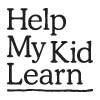What to do with this activity?
When your child is learning to read, they will start to spot words they know in different places. Pick a simple word you know they will recognise, like "there" or "here". Or choose a word that you don't see a lot. Show them the newspaper or magazine or online content you are reading, or look at signs in public places together. See if they can point to a familiar word.
Play a game of "hunt the word". Choose a word and see if they can find it on the page or, if it is a common word, how many of that word they can find.
Recognising whole words in different places will give your child confidence. As time goes by, they will see more and more words that they recognise.
It really helps if your child sees you reading, whether it's a newspaper, a magazine, something online, or a book. Show them that reading is part of everyday life.
-
Why am I doing this?
The written word is everywhere and by pointing out words around you everyday, your child will realise the usefulness of reading and how it brings information and knowledge of the wider world into your lives.
Reading together shows your child that you think reading is important. It helps your child to link the words on the page to how they are spoken and to begin to recognise words.
-
How can I do more?
Encourage your child to read by giving them books or information about what they are interested in, for example, if they are interested in cars, give them books about cars – it’s a great motivator. Use comics, magazines and newspapers to provide lots of new words and facts. Your child can use the pictures for information about the words they are reading.
Read longer books to your child. This will help with memory.
You could do ‘paired reading’ – your child chooses a book or comic to read.
- At first, both of you read aloud together. When the child is ready, they carry on reading alone.
- If they don’t know a word, you say it for them and both of you continue to read together until they are ready to read alone again.
- No pressure is made to get them to read by themselves. They only do it when they are ready. This is useful with older children when they find text books difficult.Your child might like to practise their reading skills by reading to younger children.
Discuss with your child’s teacher if they are having difficulty reading.
Rate this activity
![]()
![]()
![]()
![]()
![]()
Based on 5 reviews
How would you rate it?
1 = Poor, 5 = Great.



